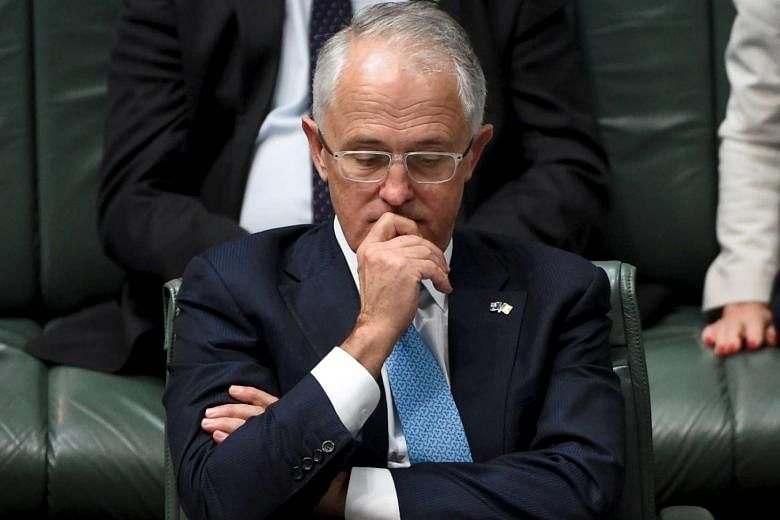SYDNEY • Australian Prime Minister Malcolm Turnbull set the stage for early elections on July 2, despite signs his personal popularity is sagging, by recalling Parliament in the boldest gamble of his short leadership.
Mr Turnbull grabbed power in a ruling Liberal Party coup last September, pledging better management of the economy, but has failed to push ahead with fiscal and industrial relations reforms with a hostile Senate blocking key legislation.
In a political gamble, Mr Turnbull said the elections would be held on July 2 unless the Upper House, where crossbenchers hold the balance of power, agrees to pass deadlocked legislation on unions.
The Senate has already rejected the Bills - one of them twice - and several key crossbenchers said last Friday they would still not budge, potentially triggering a "double dissolution" of both Houses of Parliament.
"We are calling the double dissolution election because we need to secure support... from the Australian people for important economic reforms," Mr Turnbull said, implying he did not expect the Bills to get through, setting up a showdown with the Senate.
Parliament will be recalled from its seven-week recess to sit on April 18, Mr Turnbull said yesterday, to vote on the labour reform Bills opposed by the influential Greens and the main centre-left opposition Labor Party.
The release of the 2015/16 national Budget would also be moved forward by one week to May 3, he said.
"The time for playing games is over," Mr Turnbull said in a nationally televised news conference. "This is an opportunity for the Senate to do its job of legislating rather than filibustering. The go-slows and obstruction by Labor and the Greens on this key legislation must end," he said.
An election is due by next January but had been widely expected by political pundits to be called for the second half of this year. A piece of legislation must be defeated twice by the Senate to give Mr Turnbull the trigger for early elections.
Mr Turnbull has consistently led opinion polls. His ruling conservative Liberal-National coalition has led Labor in recent polls but there are signs his honeymoon period may be ending.
A Newspoll released yesterday showed Mr Turnbull's popularity falling into negative territory for the first time. The poll of 2,049 voters, taken from last Thursday to Sunday, showed satisfaction with his performance fell to 39 per cent, while dissatisfaction rose to 43 per cent.
Labor Party leader Bill Shorten welcomed the announcement, calling it a sign of a government in "full panic mode". "Mr Turnbull has a plan for his re-election, he just doesn't have a plan for Australia," Mr Shorten told reporters.
If Mr Turnbull was to lose a July 2 election, Australia would have its sixth prime minister since 2010.
The piece of legislation that Mr Turnbull is using for early polls involves the reinstatement of the Australian Building and Construction Commission, a watchdog that was empowered to pursue allegations of misconduct in the building industries before it was disbanded under a Labor administration.
Independent and minor party senators elected at the last national elections in 2013 have stalled other key aspects of the government's agenda, including changes that would make higher education and healthcare more expensive and limit access to welfare.
REUTERS, AGENCE FRANCE-PRESSE

